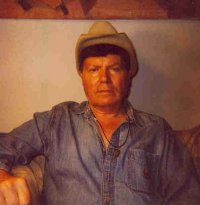Difference between revisions of "Hunter Gray"
| Line 24: | Line 24: | ||
==External Links== | ==External Links== | ||
| + | *[http://hunterbear.org/outlaw_trail1.htm Outlaw Trail] | ||
*[http://www.hunterbear.org/ The Lair of the Hunter Bear] | *[http://www.hunterbear.org/ The Lair of the Hunter Bear] | ||
Revision as of 01:31, 20 April 2010
Hunter Gray taught in Indian Studies [and Honors] at the University of North Dakota for thirteen years [full professor and chair in Indian Studies], and was a member of its graduate faculty. He was deeply and consistently involved in Indian rights, labor unionization, civil rights and civil liberties.[1] Gray also has a site entitled The Lair of Hunter Bear that contains a vast amount of Native American, civil rights, civil liberties, labor and related social justice material.
From Hunter Gray's resume page:
- I'm an organizer -- a working social justice agitator. I've been one since the mid-1950s and I'll always be one. In many respects, it's one of the toughest trails anyone could ever blaze.
- An effective organizer seeks to get grassroots people together -- and does; develops on-going and democratic local leadership; deals effectively with grievances and individual/family concerns; works with the people to achieve basic organizational goals and develop new ones; and builds a sense of the New World To Come Over The Mountains Yonder -- and how all of that relates to the shorter term steps.
Supporting Civil Rights
In the 1960's, radical activist Hunter Gray, attempted to enlist Ralph Helstein, Charles Hayes and especially Jesse Prosten to help finance "civil rights" activists in the South.[2]
- In April, 1966, with the Civil Rights Movement having now substantially opened up much of the South, I met at Chicago with Ralph Helstein, President of United Packinghouse Workers and Vice-President Charles Hayes and Director of Organization Jesse Prosten.
- Packinghouse, of course, although AFL-CIO, was certainly anything except a business union. Its leaders were essentially radicals. I carried a complex but clear and direct proposal from the Deep South that Jesse -- a friend -- strongly supported: that Packinghouse would fund a number of proven civil rights organizers in Mississippi and the Carolinas who would focus on broad community grassroots organization. And those new, broad organizations would both stimulate new, interracial unionism in those Southern settings and would provide significantly tangible community support for union organizing and eventual strike actions. In the end, although Jesse -- Director of Organization -- continued to support the proposal with the greatest vigour, Packinghouse backed away. Again --money, more than anything else.
CCDS
In 2010, Hunter Gray was the Idaho contact for Committees of Correspondence for Democracy and Socialism.[3]
External Links
References
- ↑ The Strange, Beautiful Land of North Dakota -- and the Unsolved Murders of Natives leninist-international, Dec. 27, 2001
- ↑ Organizing: Unionism and the South (a colloquy) leninist-international, Apr. 6, 2003
- ↑ Contact Committees of Correspondence for Democracy and Socialism
